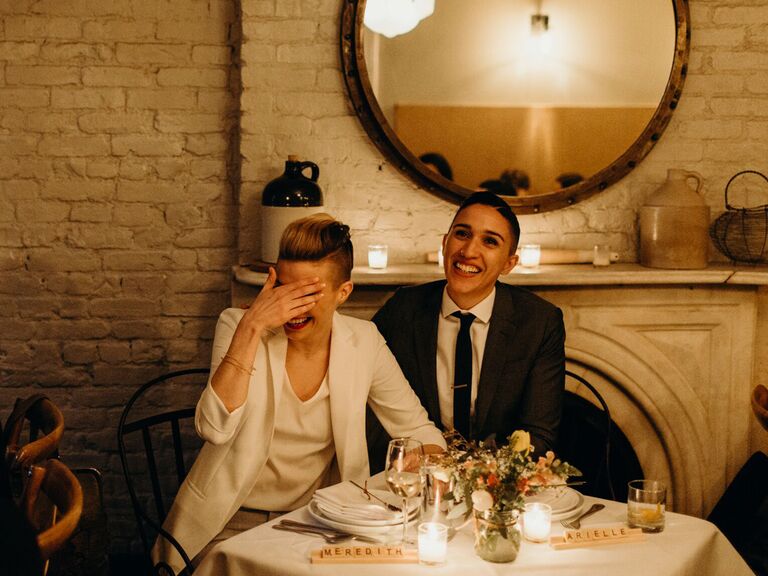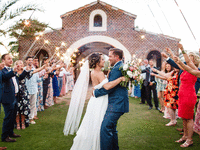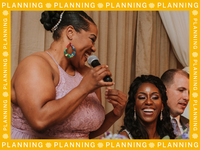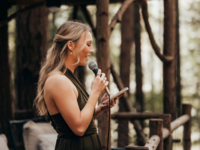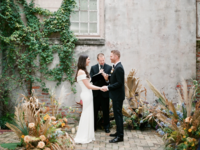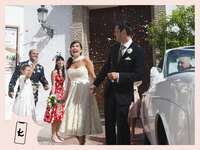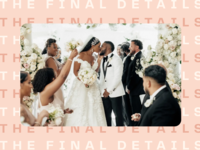Here's the Wedding Speech Order to Follow at Your Reception
Mapping out your ideal wedding reception timeline is an art form. You want the wedding day to flow from beginning to end, with numerous memorable moments along the way, including the wedding speeches. Choosing the wedding speech order is a big part of finalizing your reception timeline, since it's important to get the wedding toasts and speeches checked off before the dancing and festivities begin. To help you nail it down, we've outlined the traditional order of speeches at a wedding, along with some options for more modern wedding speech orders and other important speech-related questions. But above all, the most important thing to remember is that this is just a guideline—you don't have to follow it exactly (or at all). Use this order of wedding reception speeches as a starting point, but feel free to adjust accordingly, too.
In this article:
- Who Speaks First at Weddings?
- The Traditional Wedding Speech Order
- Do You Have to Follow the Traditional Wedding Speech Order?
- How Many Speeches Do You Have at a Wedding?
- Are Wedding Speeches Before or After the Meal?
Who Speaks First at Weddings?
Typically, the father of the bride is first in the traditional wedding speech order. In the past, this was because the bride's parents were usually the ones hosting (read: paying for) the wedding, says Trista Croce, founder of luxury wedding planning and event company BTS Event Management based in Phoenix, Arizona. However, for many couples, this may or may not be the case. In today's world, it's not unheard of for the groom's parents to pitch in for wedding costs, or for the couple to be footing the bill themselves. So in these cases, it's really up to the couple to decide who should speak first. It can be whoever hosts the wedding, the best man, or one or both parents if they choose to stick to tradition.
The Traditional Wedding Speech Order
Yes, there's a specific order for traditional wedding speeches, but if you don't know where to begin, let us guide you through it. Here's the rundown of who gives the welcome speech at a wedding, when the father of the bride should give a speech and more.
1. The Father of the Bride or Parents of the Bride
The father of the bride speech is often one of the most special and tear-jerking moments of the day—and it's usually the first toast given when following the traditional order of speeches at the wedding. The father of the bride will typically start off by welcoming guests and thanking them for coming. The speech can also include a heartfelt anecdote about the bride and some words of wisdom for the happy couple. Depending on the situation, the mother of the bride can give a speech along with (or in place of) the father of the bride.
2. The Father of the Groom or Parents of the Groom
Next up in the traditional order of toasts at a wedding, according to Croce, is the groom's family. This could include the father of the groom's speech, mother of the groom speech or a few words from both parents. Some couples opt to have the father of the groom's speech take place during the rehearsal dinner instead, as old-school wedding etiquette stated that the groom's parents host the rehearsal dinner while the bride's parents host the wedding. But as always, who speaks at the reception and in what wedding speech order will depend on your relationship, your family situation and your personal preference.
3. The Maid of Honor
Following the parent speeches, Croce recommends having the maid of honor go next in the wedding toast order. However, some couples opt to flip the order and have the best man speak first followed by the maid of honor. The maid of honor speech typically includes an introduction and a short story explaining their relationship with the couple, personal anecdotes, funny stories, encouraging words and a closing remark with a toast.
4. The Best Man
The last speech on the agenda is the best man speech, which can follow the same format as the maid of honor speech. The best man can start by introducing himself, congratulating the couple, sharing a story about the groom and offering nice words about their new spouse. They can also mix in a tasteful joke or two and end with a wedding toast to the newlyweds and their future together.
5. The Master of Ceremonies
Although not considered part of the traditional wedding speech order, another "speaker" that can take the mic during a wedding reception is a master of ceremonies. In most cases, your wedding DJ or your wedding band leader will handle it. But for a modern wedding speech order alternative, you could choose to have someone you know or hire a different professional for the role. This, of course, is optional and there are pros and cons to consider, but it can be a fun way to add some structure (and humor!) to the reception.


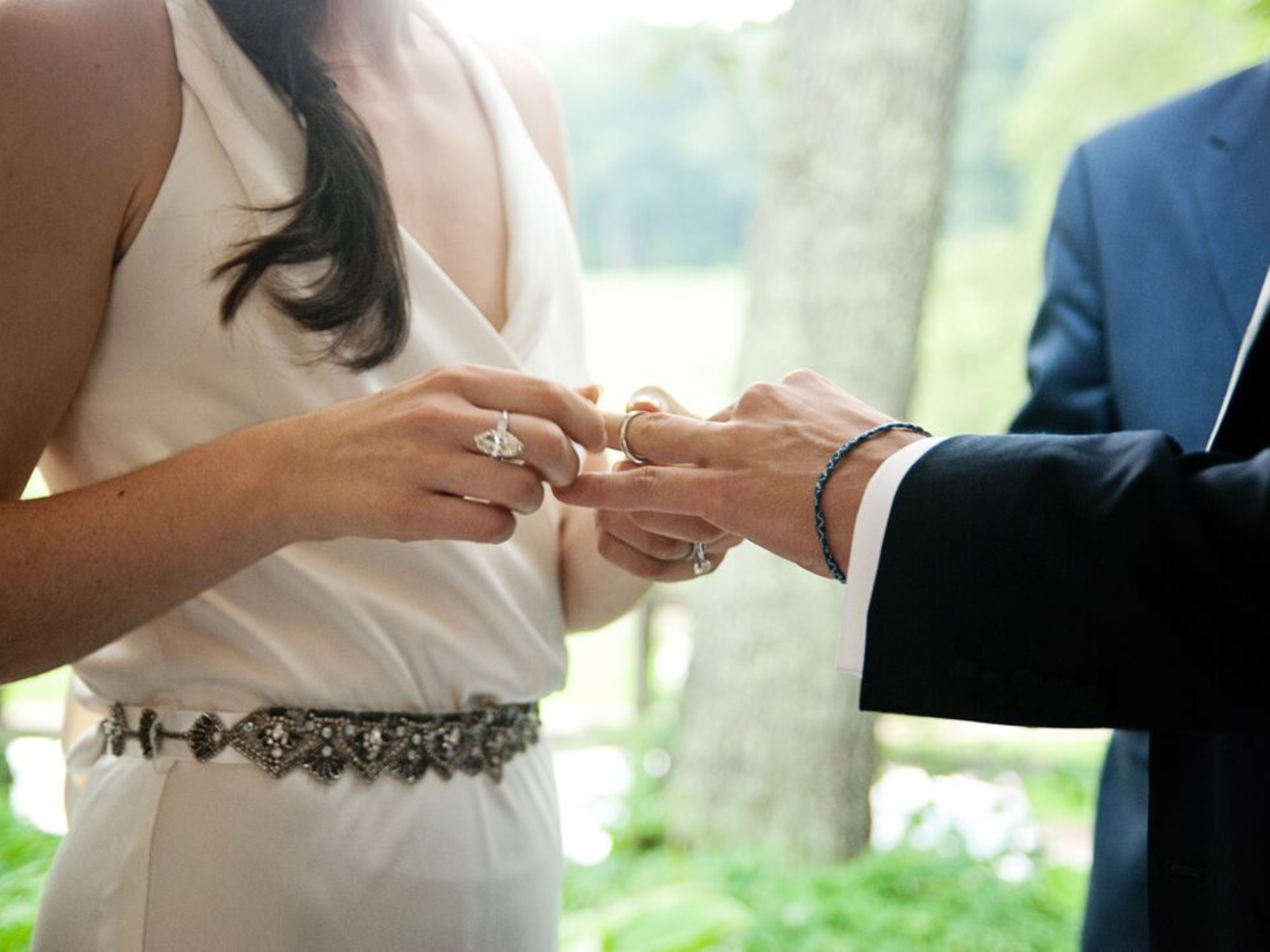
Do You Have to Follow the Traditional Wedding Speech Order?
Following the traditional order of wedding speeches is a good starting point, but you should always feel free to do what works best for your specific situation. Wedding traditions are just that—traditions. They're not rules couples must follow. "Family dynamics and friends are so different these days," Croce says. "This format is not going to suit everyone." Some people may also not feel comfortable with public speaking and choose not to give a speech. Our tip: use the traditional wedding speech order above as a guideline and decide on the wedding speech order that makes sense for you, your partner and your guests.
If you're weighing the pros and cons of a more modern wedding speech order, first consider the specific people who you'd want to speak at your wedding. You might skip the traditional parent speeches in favor of someone else, like the brother of the bride, sister of the groom or vice versa. And while it's not required, the newlyweds can give speeches too—whether individually or together—to give guests a warm welcome and express their appreciation to everyone who showed up to celebrate their big day. In that case, adding a bride's toast or groom's toast to the order of wedding speeches is another option. Lastly, you might have children (like the daughter of the bride), stepchildren or other close loved ones who would be honored to speak at the reception.
How Many Speeches Do You Have at a Wedding?
In most cases, it's best to limit the number of wedding reception speeches to no more than four people. Whatever you decide, keep the total length of speeches in mind. If you decide to have more than four speeches during the reception, ensure each of them is brief. The last thing you want is for speeches to drag on and cut into the rest of the reception timeline, such as dinner and cutting of the cake. A good rule of thumb, Croce recommends, is keeping the entire speech portion of the reception to 20 minutes, maximum. From there, you can divide up those minutes between the different speakers.
If there are other important people in your lives who would also like to say a few words as well, such as wedding party members (bridesmaids, groomsmen), grandparents or close friends, you can ask them to give a speech at the rehearsal dinner instead. Rehearsal dinners are often more casual, intimate and less structured, which means there's more wiggle room for additional speakers that won't have the chance to speak during the wedding reception.
Are Wedding Speeches Before or After the Meal?
Wedding speeches typically take place during the meal at the wedding reception.The sweet spot, according to Croce, is starting the speeches about 3/4 of the way through dinner as guests are finishing up their meal and still seated. That way, once the speeches are wrapped up, guests will be done eating, tables will start being cleared and everyone will be ready to hit the dance floor and get the party started.
Timing is very important, especially with speeches, because you want to have your guests' undivided attention and keep them entertained and engaged all the way through. If speeches are done too early on during the meal, guests will still be finding their seats, chatting amongst each other and servers may be shuffling around, which can be noisy and distracting for guests. If the wedding speeches are done after the meal, guests may be feeling antsy to get up, move around and mingle.
Samantha Iacia contributed to the reporting of this article.
